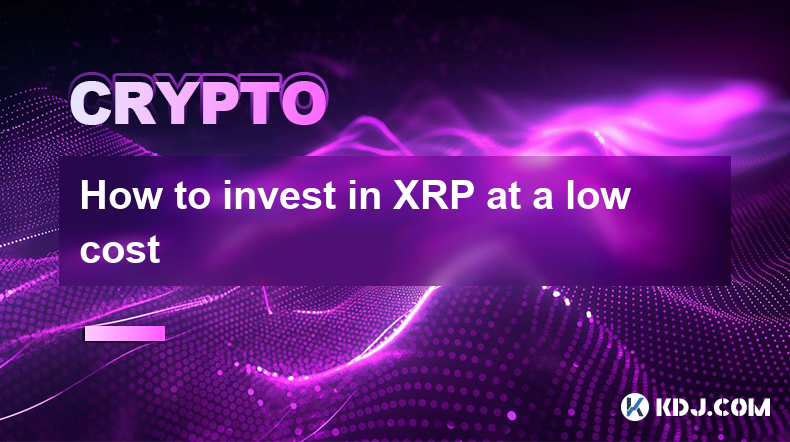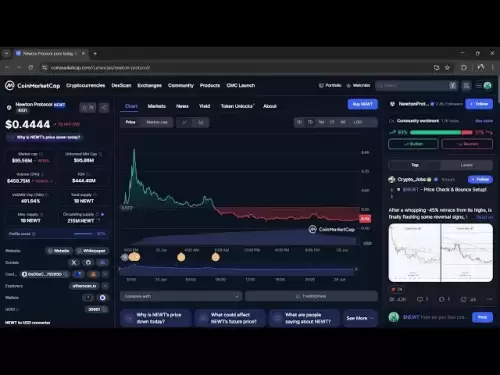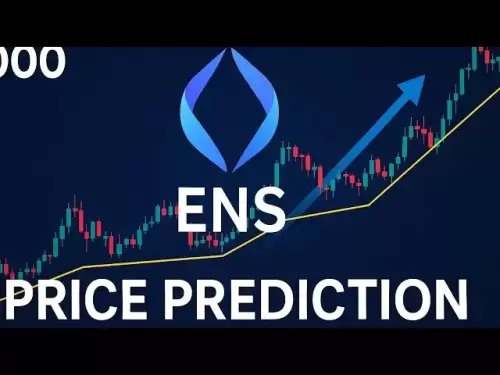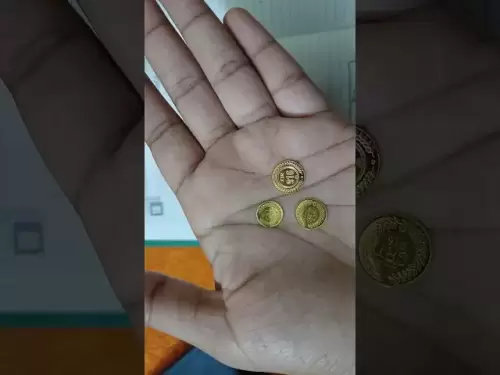-
 Bitcoin
Bitcoin $107,467.9126
1.26% -
 Ethereum
Ethereum $2,447.5288
-0.12% -
 Tether USDt
Tether USDt $1.0005
0.00% -
 XRP
XRP $2.1921
0.13% -
 BNB
BNB $647.2897
0.50% -
 Solana
Solana $144.8627
-0.37% -
 USDC
USDC $0.9996
-0.03% -
 TRON
TRON $0.2732
0.10% -
 Dogecoin
Dogecoin $0.1652
-0.18% -
 Cardano
Cardano $0.5700
-2.87% -
 Hyperliquid
Hyperliquid $37.0274
-1.81% -
 Bitcoin Cash
Bitcoin Cash $484.6957
0.19% -
 Sui
Sui $2.7354
-2.19% -
 Chainlink
Chainlink $13.1727
-1.49% -
 UNUS SED LEO
UNUS SED LEO $8.9978
-0.04% -
 Stellar
Stellar $0.2421
-2.33% -
 Avalanche
Avalanche $17.5633
-3.51% -
 Toncoin
Toncoin $2.8476
-1.94% -
 Shiba Inu
Shiba Inu $0.0...01166
-0.56% -
 Litecoin
Litecoin $85.1071
0.09% -
 Hedera
Hedera $0.1502
-2.96% -
 Monero
Monero $310.2774
-1.64% -
 Dai
Dai $0.9999
-0.01% -
 Polkadot
Polkadot $3.3584
-1.88% -
 Ethena USDe
Ethena USDe $1.0003
-0.04% -
 Bitget Token
Bitget Token $4.4443
2.90% -
 Pi
Pi $0.6242
14.04% -
 Uniswap
Uniswap $6.9774
-2.86% -
 Pepe
Pepe $0.0...09535
-5.05% -
 Aave
Aave $256.7574
-3.35%
How to invest in XRP at a low cost
To minimize costs when investing in XRP, choose exchanges with low trading fees, batch transactions, and consider dollar-cost averaging to manage volatility.
Mar 27, 2025 at 11:00 am

Investing in cryptocurrencies can be exciting, but also daunting. Many investors, especially those new to the space, want to minimize their investment costs. This article explores how to acquire XRP, often referred to as Ripple, at the lowest possible cost, focusing solely on the cryptocurrency aspects.
Understanding XRP Trading Fees
The cost of investing in XRP isn't just about the price of the coin itself. Several fees can add up, impacting your overall investment. Understanding these fees is crucial for minimizing your expenses. These fees typically include trading fees charged by exchanges, network fees (transaction fees on the XRP Ledger), and potential withdrawal fees.
Exchange Trading Fees: Different cryptocurrency exchanges charge varying trading fees. Some exchanges operate on a maker-taker model, rewarding users who add liquidity to the order book with lower fees or even rebates. Others charge a flat percentage fee per trade. Researching exchanges with low trading fees is paramount.
Network Fees (Transaction Fees): Sending XRP on the XRP Ledger incurs a small transaction fee. This fee is usually negligible compared to trading fees, but it's important to be aware of it. The fee is denominated in XRP and is set by the sender. Always check the current network fee before sending XRP.
Withdrawal Fees: Exchanges often charge a fee to withdraw your XRP to an external wallet. These fees can vary significantly between exchanges. Compare withdrawal fees across different platforms before choosing an exchange.
Choosing the Right Cryptocurrency Exchange
Selecting the right exchange is fundamental to low-cost XRP investment. Consider these factors:
Trading Fees: Prioritize exchanges with low trading fees or maker-taker models that can reward active trading.
Deposit Methods: Check if the exchange supports your preferred deposit method (e.g., bank transfer, credit/debit card) and whether there are any associated fees. Opt for deposit methods with minimal or no fees.
Security: Security is paramount. Choose a reputable exchange with robust security measures to protect your investment. Never compromise security for lower fees.
Liquidity: High liquidity ensures you can buy and sell XRP quickly without significantly impacting the price. High liquidity minimizes slippage, preventing unexpected losses.
Reputation and Regulation: Choose a well-established exchange with a good reputation and, ideally, some form of regulatory oversight, although this is not always a guarantee of security.
Minimizing XRP Transaction Costs
Beyond exchange fees, minimizing transaction costs involves strategic actions:
Batching Transactions: Combining multiple XRP transactions into a single larger transaction can reduce the overall cost per XRP transferred. Consolidate your transactions whenever possible.
Choosing the Right Wallet: While not directly related to purchase costs, using a secure and compatible wallet is crucial. Different wallets may have varying levels of integration with exchanges, impacting transaction efficiency. Research wallets compatible with your chosen exchange.
Timing Your Purchases: Market volatility can impact the price of XRP. While not directly a cost-saving measure, purchasing during periods of lower price can indirectly reduce your overall investment cost. Conduct thorough market research before investing.
Dollar-Cost Averaging (DCA): This strategy involves investing a fixed amount of money at regular intervals, regardless of price fluctuations. This mitigates the risk of investing a lump sum at a market peak. DCA can smooth out volatility and reduce the impact of short-term price swings.
Understanding XRP's Price Volatility
XRP's price, like most cryptocurrencies, is highly volatile. This volatility isn't a cost in itself, but it can significantly impact the value of your investment. Understanding this volatility is crucial for managing risk. Never invest more than you can afford to lose. Researching market trends and news related to XRP can help you make more informed investment decisions.
Frequently Asked Questions
Q: What are the best low-fee exchanges for buying XRP?
A: Several exchanges offer competitive fees. However, it's crucial to research and compare fees on your own, as fees can change. Look at platforms like Kraken, Binance, and Coinbase Pro, but always verify current fee structures before committing.
Q: Are there any hidden fees when buying XRP?
A: While major hidden fees are rare on reputable exchanges, always carefully review all charges before confirming any transaction. Pay close attention to deposit and withdrawal fees, as these can vary significantly.
Q: How can I avoid high transaction fees when sending XRP?
A: Use exchanges that offer low or no withdrawal fees. Batch transactions whenever possible to minimize the overall cost. Also, be aware of the network fee (transaction fee) on the XRP Ledger itself, although this is usually minimal.
Q: Is it cheaper to buy XRP directly from another person?
A: Peer-to-peer transactions can sometimes offer lower fees, but they carry significantly higher risks. Security and verification are much harder to ensure in such transactions. The convenience and regulatory compliance of using established exchanges usually outweigh any small potential fee savings from peer-to-peer trading.
Q: What is the best strategy for investing in XRP?
A: There is no single "best" strategy. Dollar-cost averaging can help mitigate risk, but individual circumstances and risk tolerance should guide investment decisions. Always conduct thorough research and consider consulting with a financial advisor.
Disclaimer:info@kdj.com
The information provided is not trading advice. kdj.com does not assume any responsibility for any investments made based on the information provided in this article. Cryptocurrencies are highly volatile and it is highly recommended that you invest with caution after thorough research!
If you believe that the content used on this website infringes your copyright, please contact us immediately (info@kdj.com) and we will delete it promptly.
- BNB Price Check: Can Binance Coin Reserves Fuel a Rally to $800?
- 2025-06-26 20:25:12
- PEPD, Memes, and Ethereum: A New Era of Meme Utility?
- 2025-06-26 20:25:12
- DOGE, BlockDAG, and Coin Airdrops: The New Wave of Crypto Opportunities
- 2025-06-26 18:45:12
- Neo Pepe and the Crypto Presales Popping in June 2025
- 2025-06-26 18:45:12
- Bitcoin, DeFi Tokens, and Relist Moves: What's Hot in Crypto Right Now
- 2025-06-26 18:30:11
- Binance, Bitcoin, and Altcoins: Navigating the Crypto Landscape
- 2025-06-26 19:05:12
Related knowledge

How to customize USDT TRC20 mining fees? Flexible adjustment tutorial
Jun 13,2025 at 01:42am
Understanding USDT TRC20 Mining FeesMining fees on the TRON (TRC20) network are essential for processing transactions. Unlike Bitcoin or Ethereum, where miners directly validate transactions, TRON uses a delegated proof-of-stake (DPoS) mechanism. However, users still need to pay bandwidth and energy fees, which are collectively referred to as 'mining fe...

USDT TRC20 transaction is stuck? Solution summary
Jun 14,2025 at 11:15pm
Understanding USDT TRC20 TransactionsWhen users mention that a USDT TRC20 transaction is stuck, they typically refer to a situation where the transfer of Tether (USDT) on the TRON blockchain has not been confirmed for an extended period. This issue may arise due to various reasons such as network congestion, insufficient transaction fees, or wallet-rela...

How to cancel USDT TRC20 unconfirmed transactions? Operation guide
Jun 13,2025 at 11:01pm
Understanding USDT TRC20 Unconfirmed TransactionsWhen dealing with USDT TRC20 transactions, it’s crucial to understand what an unconfirmed transaction means. An unconfirmed transaction is one that has been broadcasted to the blockchain network but hasn’t yet been included in a block. This typically occurs due to low transaction fees or network congestio...

How to check USDT TRC20 balance? Introduction to multiple query methods
Jun 21,2025 at 02:42am
Understanding USDT TRC20 and Its ImportanceUSDT (Tether) is one of the most widely used stablecoins in the cryptocurrency market. It exists on multiple blockchain networks, including TRC20, which operates on the Tron (TRX) network. Checking your USDT TRC20 balance accurately is crucial for users who hold or transact with this asset. Whether you're sendi...

What to do if USDT TRC20 transfers are congested? Speed up trading skills
Jun 13,2025 at 09:56am
Understanding USDT TRC20 Transfer CongestionWhen transferring USDT TRC20, users may occasionally experience delays or congestion. This typically occurs due to network overload on the TRON blockchain, which hosts the TRC20 version of Tether. Unlike the ERC20 variant (which runs on Ethereum), TRC20 transactions are generally faster and cheaper, but during...

The relationship between USDT TRC20 and TRON chain: technical background analysis
Jun 12,2025 at 01:28pm
What is USDT TRC20?USDT TRC20 refers to the Tether (USDT) token issued on the TRON blockchain using the TRC-20 standard. Unlike the more commonly known ERC-20 version of USDT (which runs on Ethereum), the TRC-20 variant leverages the TRON network's infrastructure for faster and cheaper transactions. The emergence of this version came as part of Tether’s...

How to customize USDT TRC20 mining fees? Flexible adjustment tutorial
Jun 13,2025 at 01:42am
Understanding USDT TRC20 Mining FeesMining fees on the TRON (TRC20) network are essential for processing transactions. Unlike Bitcoin or Ethereum, where miners directly validate transactions, TRON uses a delegated proof-of-stake (DPoS) mechanism. However, users still need to pay bandwidth and energy fees, which are collectively referred to as 'mining fe...

USDT TRC20 transaction is stuck? Solution summary
Jun 14,2025 at 11:15pm
Understanding USDT TRC20 TransactionsWhen users mention that a USDT TRC20 transaction is stuck, they typically refer to a situation where the transfer of Tether (USDT) on the TRON blockchain has not been confirmed for an extended period. This issue may arise due to various reasons such as network congestion, insufficient transaction fees, or wallet-rela...

How to cancel USDT TRC20 unconfirmed transactions? Operation guide
Jun 13,2025 at 11:01pm
Understanding USDT TRC20 Unconfirmed TransactionsWhen dealing with USDT TRC20 transactions, it’s crucial to understand what an unconfirmed transaction means. An unconfirmed transaction is one that has been broadcasted to the blockchain network but hasn’t yet been included in a block. This typically occurs due to low transaction fees or network congestio...

How to check USDT TRC20 balance? Introduction to multiple query methods
Jun 21,2025 at 02:42am
Understanding USDT TRC20 and Its ImportanceUSDT (Tether) is one of the most widely used stablecoins in the cryptocurrency market. It exists on multiple blockchain networks, including TRC20, which operates on the Tron (TRX) network. Checking your USDT TRC20 balance accurately is crucial for users who hold or transact with this asset. Whether you're sendi...

What to do if USDT TRC20 transfers are congested? Speed up trading skills
Jun 13,2025 at 09:56am
Understanding USDT TRC20 Transfer CongestionWhen transferring USDT TRC20, users may occasionally experience delays or congestion. This typically occurs due to network overload on the TRON blockchain, which hosts the TRC20 version of Tether. Unlike the ERC20 variant (which runs on Ethereum), TRC20 transactions are generally faster and cheaper, but during...

The relationship between USDT TRC20 and TRON chain: technical background analysis
Jun 12,2025 at 01:28pm
What is USDT TRC20?USDT TRC20 refers to the Tether (USDT) token issued on the TRON blockchain using the TRC-20 standard. Unlike the more commonly known ERC-20 version of USDT (which runs on Ethereum), the TRC-20 variant leverages the TRON network's infrastructure for faster and cheaper transactions. The emergence of this version came as part of Tether’s...
See all articles
























































































